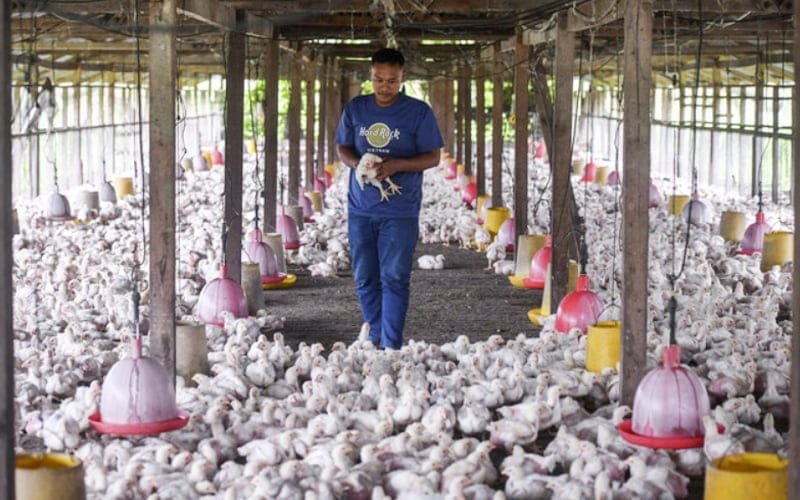- This topic is empty.
- AuthorPosts
- Aprili 4, 2025 at 12:16 um #620863

Maintaining essential records for tracking broiler performance and profitability in nigerian poultry farms is not merely an administrative task but a fundamental pillar for informed decision-making and sustainable business growth within the local agricultural landscape.
Accurate and consistent record-keeping provides valuable insights into the efficiency of production processes, helps identify areas for improvement, and ultimately contributes to enhanced profitability in the dynamic nigerian poultry sector.
1. Daily Feed Consumption and Feed Conversion Ratio
Tracking daily feed consumption is paramount for understanding the efficiency of feed utilization, which constitutes a significant portion of the production cost in broiler farming. Recording the amount of feed provided to the birds each day, coupled with regular weighing of the flock, allows farmers to calculate the feed conversion ratio (FCR).
The FCR, which represents the amount of feed required to produce one kilogram of body weight, is a critical indicator of production efficiency. Monitoring trends in FCR can help identify potential issues such as feed wastage, inadequate feed formulation, or underlying health problems affecting nutrient absorption.
In the context of nigerian poultry farms, where feed costs can fluctuate, precise feed consumption records are invaluable for cost management.
2. Daily Mortality and Morbidity Rates
Accurate records of daily mortality and morbidity rates are crucial for assessing the health status of the broiler flock. Recording the number of birds that die each day, along with any observed signs of illness or disease, provides early warnings of potential health challenges.
Analyzing these records can help farmers identify patterns, determine the potential causes of mortality or morbidity (such as specific diseases or environmental stressors prevalent in nigerian poultry environments), and implement timely interventions to prevent further losses.
Prompt identification and management of health issues are essential for maintaining flock productivity and minimizing economic losses.
3. Weekly Weight Gain and Growth Uniformity
Regularly weighing a representative sample of the broiler flock on a weekly basis is essential for monitoring their growth performance.
Tracking the average weekly weight gain provides insights into whether the birds are achieving their expected growth trajectory based on their age and breed. Furthermore, assessing the uniformity of growth within the flock is important.
Significant variations in weight can indicate issues such as uneven feed distribution, overcrowding, or the presence of weaker or sick birds. In nigerian poultry farming, where market preferences for broiler size may vary, consistent weight gain and flock uniformity are key to meeting market demands and optimizing sales.
4. Vaccination and Medication Records
Maintaining detailed records of all vaccinations and medications administered to the broiler flock is critical for ensuring their health and biosecurity.
These records should include the date of administration, the type of vaccine or medication used, the dosage, and the batch number. In the nigerian context, where disease outbreaks can pose significant threats to poultry farms, accurate vaccination records help demonstrate compliance with health protocols and aid in tracing the source of any disease issues.
Medication records are important for tracking treatment effectiveness and ensuring adherence to withdrawal periods before the birds are marketed, safeguarding consumer health.
5. Production Costs and Revenue
Comprehensive financial records, encompassing all production costs and revenue generated, are essential for determining the profitability of the broiler operation.
This includes tracking expenses such as feed purchases, chick costs, labor, utilities, medications, and transportation. Revenue should be recorded from the sale of broilers.
Regularly analyzing these financial records allows farmers to calculate key profitability metrics, identify areas where costs can be optimized, and make informed decisions regarding future investments and production planning.
In the competitive nigerian poultry market, a clear understanding of the farm’s financial performance is vital for long-term sustainability.
In conclusion, the meticulous maintenance of essential records for tracking broiler performance and profitability in nigerian poultry farms provides a powerful tool for effective farm management.
By diligently recording data on feed consumption, mortality, growth rates, health interventions, and financial transactions, poultry farmers in nigeria can gain valuable insights that enable them to optimize their production practices, mitigate risks, enhance efficiency, and ultimately achieve greater profitability in their broiler enterprises.
Read Also:Finisher Feeds: The Final Stage of Poultry Nutrition
- AuthorPosts
- You must be logged in to reply to this topic.

